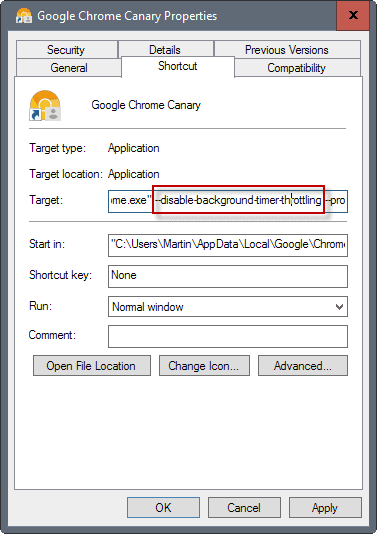Chrome 57: throttling of background tabs begins

Google Chrome 57 is the first stable version of the web browser for the desktop that ships with the background tab throttling power optimization feature.
Google announced back in January 2017 that its Chrome web browser would start to throttle expensive background pages in the near future.
This change is now live in Chrome Stable. According to the new blog post on the official Chromium Blog, Chrome "will throttle individual background tabs by limiting the timer fire rate for background tabs using excessive power".
While timers of background tabs in Chrome were limited to run once per second already, the change throttles access to the CPU so that background tabs may use on average 1% of a core when they run in the background.

Google notes that tabs that run real-time applications such as audio playing in the background or WebRTC / WebSockets are not affected by the change.
The change leads to 25% "fewer busy background tabs" according to Google, but benchmarks for how that translates to power improvement has not been published by the company.
Users may opt out of the extra tab throttling right now by loading Chrome with the --disable-background-timer-throttling flag.
This is done in the following way on Windows machines:
- Right-click on the Chrome icon in the taskbar.
- Right-click on Chrome in the menu that opens, and select properties from it.
- Add --disable-background-timer-throttling to the end of the target field. Make sure there is a space between the path and the flag, e.g. "C:\Users\Martin\AppData\Local\Google\Chrome SxS\Application\chrome.exe" --disable-background-timer-throttling
Google created the flag for "use cases like running test suites and other sanctioned heavy computations", but it is available to all users of the browser.
The company has long term plans for the feature (and we mean long term as the last entry of the roadmap is set to 2020+):
- Explicit opt-outs (~Q2 2017, when FeaturePolicy ships)
- Suspend all tasks on mobile (~Q2 2017)
- Throttling non-timer tasks (~Q2 2017)
- Budget-based throttling for offscreen frames (~Q3 2017)
- Throttling web workers (~2018)
- Suspend all background tabs (~2018)
- Remove opt-outs (~2020+)
Google engineers plan to enable opt-outs that web apps and sites may use to opt-out from some forms of throttling. Also, in the second quarter of 2017, Google plans to throttle non-timer tasks, e.g. loading tasks, web workers in 2018, and to suspend all background tabs in 2018 as well.



















Hi, Martin.
Is it possible that you could fully write out of the commands, so that I can copy and paste them into the correct boxes.
A step by step instruction guide would be very helpful with a couple of illustrations (as I am a novice/noob), because my chrome browser has slowed down to a crawl since Version 57.
Regards.
The easiest way right now is to load chrome://flags/#expensive-background-timer-throttling in Chrome, and use the menu to disable the feature. Then restart.
Hi, Martin,
Thank you for the helpful reply.
To me, this is a great enhancement to Chrome.
Since Firefox has announced their migration to WebExtensions for v57, I’ve been looking to see if I can duplicate my Firefox set up on Chromium.
Chrome has a tab discarding feature that is on par with Firefox’s Suspend Tabs addon, which I use on all my Firefox installs. You can enable this with The Great Discarder or Tiny Suspender on Chrome.
For an alternative to Self-Destructing Cookies, you can use Cookie AutoDelete. That extension doesn’t handle clearing local storage at the moment though.
The hunt continues!
Where are all the anti-Google fanboys at? if this was a Firefox article there would be at least 30 or 40 comments with at least 90% bashing Firefox and Mozilla. i mean come on, this is Google were talking about…..
This is why I am glad that there is still some browser competition (even if Chrome is eating the competition alive right now). Edge may not be everyone’s cup of tea (same for Opera), but their jabs at Google over Chrome’s battery life probably played a big role in Google all of a sudden giving a crap about the battery consumption of their browser.
That’s why I refuse to use Chrome or chrome based browsers, their “engineers” always know better than you.
You can’t even disable history without installing some shady extension.
So, they assume your system runs off a battery and that you have to worry about using “too much” power?
I would assume that Google did this while also ensuring that performance was not impacted. It would be interesting to see if any performance degradation occurs after this change.
I’m seeing the flag “chrome://flags/#expensive-background-timer-throttling” in Chrome stable and in the latest snapshot of Vivaldi, I imagine it’s in all chromium browsers using the 57 base. I have it set to “Enabled” which is probably the “Default” but that’s just my preference.
Another new flag I see is “chrome://flags/#enable-nostate-prefetch” I have it set to “Disabled” because I don’t want to use prefetch in Chrome. I wonder what Chrome is doing even though I have prefetch unchecked in Settings/Privacy.
Same here, good advise.